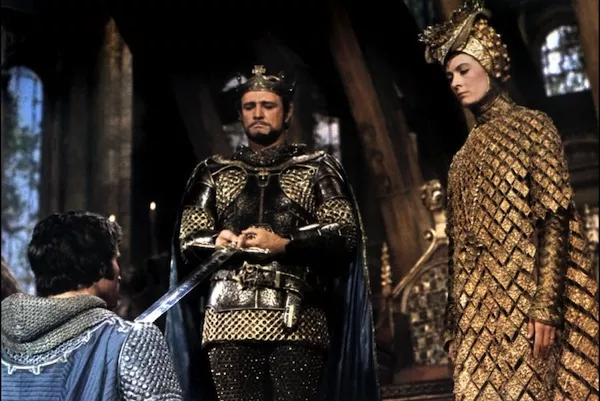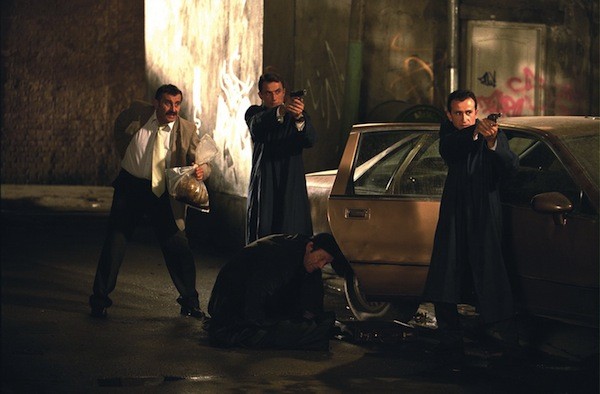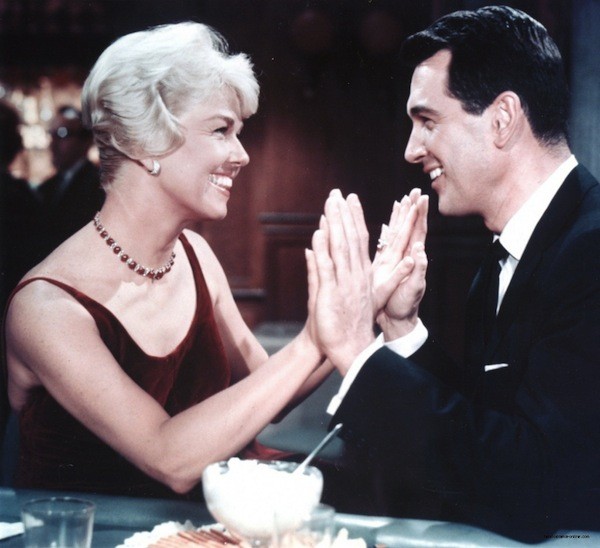(View From The Couch is a weekly column that reviews what's new on Blu-ray and DVD.)

-
A KNIGHT TO REMEMBER: Franco Nero (kneeling), Richard Harris and Vanessa Redgrave in Camelot (Photo: Warner Bros.)
CAMELOT (1967). This screen adaptation of the Broadway smash has just been released as a handsome Blu-ray Digibook, but such a pleasing package can't camouflage the mediocre movie residing inside. Albeit more financially successful than many of the late-60's film musicals that helped speed up the genre's demise, this lumbering picture features some catchy (though not top-drawer) Lerner & Loewe compositions and lavish production values but remains dramatically inert throughout its three-hour running time. The roles of King Arthur, Guenevere and Lancelot were played on stage by Richard Burton (who won a Tony), Julie Andrews and Robert Goulet, but after Burton and Andrews turned down the opportunity to reprise their roles (and Goulet was reportedly bypassed altogether), Richard Harris, Vanessa Redgrave and Franco Nero snatched up the parts. That's a shame, since they prove to be a less-than-scintillating love triangle: Harris and Redgrave can't particularly hold a tune (at least Nero was dubbed by a professional singer, an uncredited Gene Merlino), and Joshua Logan's heavy-handed direction insures that the intensity of the romances gets muted at every turn. (On the plus side, Redgrave and Nero became a couple while making this movie, and they happily remain together to this day.) The movie is often so misguided that it threatens to become a spoof worthy of Monty Python or Mel Brooks — the doddering King Pellinore (Lionel Jeffries) could easily fit into the landscape of Monty Python and the Holy Grail, and when Harris' Arthur hisses, "I demand a man's vengeance!" he sounds exactly like Cloris Leachman bleating, "Death to King Louis!" in Brooks' History of the World: Part I. (And an unfortunate shadow crossing the actor's face during that scene recalls David Krumholtz's line in 10 Things I Hate About You: "I have a dick on my face, don't I?") This earned three Academy Awards: Best Music Adaptation, Best Art Direction-Set Decoration, and Best Costume Design.
The Blu-ray Digibook also includes a CD soundtrack sampler containing four songs, among them "If Ever I Would Leave You" and "How to Handle a Woman." Extras include audio commentary by film critic Stephen Farber; a retrospective piece surrounding the making of the movie; a vintage behind-the-scenes short; and a vintage (and entertaining) half-hour TV production on Camelot's world premiere.
Movie: **

-
Michael Fassbender and Gina Carano in Haywire (Photo: Lionsgate)
HAYWIRE (2012). Appeasing everyone from your grandmother to your little sister, director Steven Soderbergh has populated Haywire with hunks of every age, starting with 67-year-old Michael Douglas and running through 51-year-old Antonio Banderas, 40-year-old Ewan McGregor, 34-year-old Michael Fassbender and 31-year-old Channing Tatum before bottoming out with 24-year-old Michael Angarano. I suppose we should thank scripter Lem Dobbs for not fashioning a role for 19-year-old Taylor Lautner to complete the spectrum. Despite that dreamboat-heavy cast, this isn't a big-screen episode of Spartacus or a sequel to Gladiator, although its leading player is best known for TV's American Gladiators. That would be Gina Carano, the mixed martial arts fighter who made her mark in the arena usually under the moniker "Crush." As he did with Kentucky Fried Chicken manager Debbie Doebereiner in Bubble and porn star Sasha Grey in The Girlfriend Experience, Soderbergh has again taken someone who hails from outside the realm of mainstream Hollywood and built a movie around her. In Carano's case, the limitations of the film aren't her fault: Admittedly, her emoting borders on the wooden side, but she does have charisma and a natural screen presence, neither of which should ever be underestimated. The plot of Haywire is nothing special: A government operative who has just successfully completed a mission gets betrayed by one (or more) of her colleagues and finds herself on the run. Carano displays some deft moves, Soderbergh directs in a coolly detached style (it's like A Dangerous Method for action junkies), and poor Channing Tatum is humbled as he emerges as the only one who's outacted by the MMA newbie.
Blu-ray extras include a featurette on Carano's career and her staged fights in the film, and brief discussions with many of the male cast members.
Movie: **1/2

-
Madonna: Truth or Dare (Lionsgate & Miramax)
MADONNA: TRUTH OR DARE (1991). If you approach this documentary expecting to learn everything you ever wanted to know about Madonna but were afraid to ask, then you'll be disappointed, as this chronicle of her 1990 Blond Ambition tour never really lets us beneath the show business front. But if you want to watch the Material Girl in all her vainglory, then the film's mostly a success, mixing moments of controversy, humor and even poignancy. In an interesting decision, director Alex Keshishian elects to shoot the half-dozen concert numbers (including "Express Yourself," "Vogue" and "Live to Tell") in color while filming the backstage material in black-and-white — these behind-the-scenes vignettes include Madonna hanging out with her back-up singers and dancers, impatiently putting up with then-boyfriend Warren Beatty (who pretty much nails the movie's inadvertent theme when, after someone asks Madonna if she'd like to talk off-camera, he comments, "She doesn't want to live off-camera, much less talk. There's nothing to say off-camera. Why would you say anything if it's off-camera?"), and interacting with her conservative father. Much of the supposedly raw material feels calculated, several off-the-cuff moments are ingratiating — the backstage meeting between Madonna and Kevin Costner, who deems her show "neat," is priceless — and still other bits now register more strongly with the passage of time. The last-named include her crush on Antonio Banderas, who would later co-star with her in 1996's Evita, and her surprising declaration that ex-husband Sean Penn is the greatest love of her life.
The only Blu-ray extras are theatrical trailers.
Movie: **1/2

-
Charles Dutton, Giancarlo Giannini, Mira Sorvino and Jeremy Northam in Mimic (Photo: Lionsgate & Miramax)
MIMIC: 3-FILM SET (1997-2003). Last September, Lionsgate released the original film on Blu-ray as a stand-alone title. Now, it's being joined by its two direct-to-video sequels, although only series completists will find it financially feasible to upgrade.
Based on the short story by Donald A. Wollheim, Mimic (1997), an early effort from Pan's Labyrinth writer-director Guillermo del Toro, finds Mira Sorvino (not long after her Mighty Aphrodite Oscar win) cast as a scientist who creates a new strain of insect to help combat a deadly disease that's being spread by cockroaches across New York City. The ploy initially works, but three years down the line, she's shocked to learn that the new breed has rushed through countless generations of development and now lives in the bowels of the New York subway system. The script by del Toro and Matthew Robbins — and, based on the advance material at the time, Steven Soderbergh and John Sayles in uncredited assists — manages to cleverly incorporate elements from mad-scientist movies, giant-insect flicks and traditional monster-on-the-loose tales, and the mere thought of roach-like critters the size of Sylvester Stallone will unnerve anyone with even a hint of a bug phobia. The fact that these creatures have the ability to "mimic" their prey (i.e. look superficially human) only adds to the discomfort, and viewers will be forgiven for wanting to rush next door and douse their neighbor with RAID.

-
Lance Henriksen (on ground) in Mimic 3: Sentinel (Photo: Lionsgate & Miramax)
With a budget of $25 million and a gross of $25 million, Mimic only broke even at the U.S. box office, which wasn't enough to warrant a theatrical sequel but apparently was deemed worthy of home-video follow-ups. And so we get Mimic 2 (2001) and Mimic 3: Sentinel (2003), neither of which were worth the effort. Mimic 2 is a more straightforward sequel, with Alix Koromzay again playing Remi Panos. A minor character in the first film, Remi's the lead here: An entomologist working as an inner-city school teacher, she's shocked to discover the bug men are back and valiantly protects a pair of students against them. Koromzay's an annoying lead, but the film does have a fairly nice twist at the end. Not so Mimic 3: Sentinel, which is basically Rear Window with killer cockroaches instead of Raymond Burr. The poor James Stewart substitute here is Karl Geary, whose allergies confine him to his dingy apartment, where he lives with his mom (Amanda Plummer) and sister (Alexis Dziena). He enjoys taking intrusive photos of his neighbors, at least until he spots some mysterious characters hanging around and begins to fear for the safety of his sister and the cute lady (Rebecca Mader) across the complex courtyard. The film (shot in Budapest, despite its NYC setting) is illogical and sloppily constructed, and not even a villainous role for Lance Henriksen can elevate it.
Blu-ray extras on Mimic: The Director's Cut include audio commentary by del Toro; a video prologue with del Toro; deleted scenes; a making-of short; an interview with del Toro as he discusses the film's troubled history; and a 10-minute look at the creature effects. Blu-ray extras on Mimic 2 include deleted scenes; a behind-the-scenes piece; and a featurette on the movie's sound design. Blu-ray extras on Mimic 3: Sentinel include audio commentary by writer-director J.T. Petty; a behind-the-scenes featurette; and cast auditions.
Mimic: ***
Mimic 2: *1/2
Mimic 3: Sentinel: *

-
Doris Day and Rock Hudson in Pillow Talk (Photo: Universal)
PILLOW TALK (1959). The 1950s produced no small amount of frothy romantic comedies centering around the lives (and lifestyles) of wealthy, winsome people, and Pillow Talk proved to be one of the biggest commercial hits in this field. In their first screen pairing, Rock Hudson and Doris Day strike sparks as two New Yorkers forced to share a party phone line. Brad Allen (Hudson) is a womanizing songwriter who ties up the telephone with endless chats with a bevy of lovestruck females, much to the frustration of interior decorator Jan Morrow (Day), who needs the phone for business calls. Their war of words over the wire escalates until Brad spots Jan in a nightclub; impressed by her beauty, he sets about wooing her under false pretenses by pretending to be a hayseed from Texas. She responds favorably to his hick routine (foreshadowing the actions of the real-life Day, who would later support that Lone Star State nitwit George W. Bush in both elections), leading to a romance that pleases her perpetually hung-over maid (Thelma Ritter) but angers her persistent suitor (Tony Randall). It's impossible to imagine this movie not being presented in CinemaScope, as the widescreen format is integral in supporting the imaginative use of split-screen techniques. Nominated for five Academy Awards (including Best Actress for Day and Best Supporting Actress for Ritter), this won for Best Original Story and Screenplay. While it deserved to beat fellow contender Operation Petticoat (like Pillow Talk, co-written by Stanley Shapiro and Maurice Richlin), no cineaste would agree with it besting the other nominees (are you ready?): Ernest Lehman's Hitchcock collaboration North By Northwest, Francois Truffaut's The 400 Blows and Ingmar Bergman's Wild Strawberries!
Blu-ray extras include audio commentary by film historians Jeff Bond, Julie Kirgo and Nick Redman; a retrospective making-of piece; a short look at the three films Hudson and Day made together; and three featurettes celebrating the 100th anniversary of Universal Studios.
Movie: ***

-
Abbie Cornish in W.E. (Anchor Bay & The Weinstein Co.)
W.E. (2011). Madonna's second film as a director (her first was 2008's barely-seen Filth and Wisdom), W.E. premiered at two prestigious film festivals (Venice and Toronto) last September, but the tepid reception convinced studio head Harvey Weinstein to throw the picture under the bus while focusing on more likely Oscar-bait titles such as The Artist, The Iron Lady and My Week with Marilyn. The final tally was a box office gross of just over $500,000 (against a $15 million dollar budget) and a Rotten Tomatoes score of 13 percent — ouch. Truth be told, the film isn't that bad, and if it had been directed by an unknown rather than a controversial media icon, it might have been more charitably dismissed as an ambitious failure. In the manner of Julie & Julia, Madonna and her co-writer Alex Keshishian (director of Madonna: Truth or Dare) have fashioned a two-tier story that whiplashes between separate eras. The period part of the film concerns itself with the scandal that rocked Britain when Edward VIII (James D'Arcy), bookmarked to be the next King of England, becomes involved with the twice-divorced American Wallis Simpson (Andrea Riseborough); the modern portion finds Wally Winthrop (Abbie Cornish), an unhappily married woman in New York, finding solace among the aforementioned couple's possessions at an auction house, and receiving further comfort from a kindly security guard (Oscar Isaacs) who works there. Perhaps surprisingly, the historical tale is the weaker one here, with Madonna basically presenting a museum piece full of texture and color but not much life (although it is amusing to contrast the various characters here with their counterparts in The King's Speech); the modern-day episode is far more interesting, thanks largely to the strong performances by Cornish and Isaacs. Arianne Phillips earned an Oscar nomination for Best Costume Design, although the most memorable contribution is the gorgeous score by Abel Korzeniowski.
The only Blu-ray extra is a making-of featurette.
Movie: **1/2
